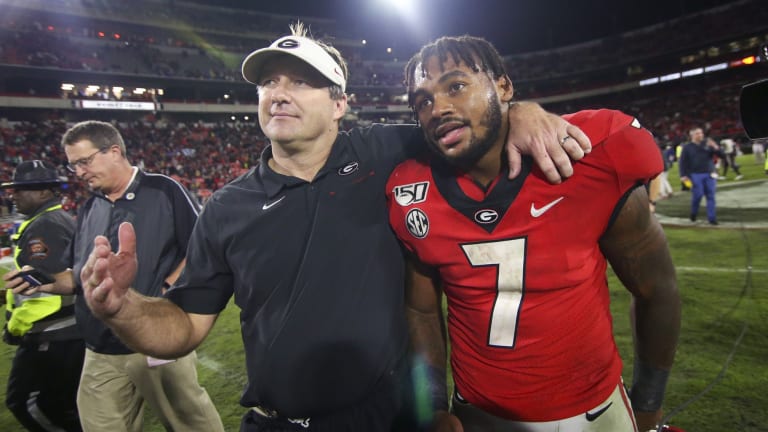
Players Start Returning To Campus this week to Face Their New Normal

For those of you who love college football and would like to see a 2020 season in some form IF AND ONLY IF it can be done safely, today marks the turning of a very important page.
For today (Monday, June 1) college football players, who have been off campus since being shut down by the COVID-19 virus on March 12, can start returning to school. Later this month they will begin drills that are solely dedicated to conditioning.
If all goes well in June then the drills become more intense and with coaches supervision in July. If that goes as planned then, when the calendar turns to August, preparations will begin for the first game which, for 13 of 14 schools in the SEC, will be on Sept. 5. Georgia opens on Sept. 7 vs. Virginia in Atlanta.
But here’s another reason why today and the rest of June are so important. Whenever the players return to campus they will learn that their football life, as they have known it, will be totally different.
Since they have been gone, the folks who run college have been working around the clock planning what they believe will be a safe environment. If they didn’t get the enormity of this by watching the news, the players will quickly learn how serious this is once they meet with their respective head coaches.
In the South we call it a “Come to Jesus meeting” where the unvarnished truth is laid on the table. And yes, fear can be part of the process.
Kirby Smart, the head football coach at the University of Georgia, has been getting ready for his “CTJ” meeting.
“I promise you there’s some of our players who don’t feel vulnerable,” Smart told a group of reporters via ZOOM last Thursday. “They feel they’re not vulnerable because of what they have heard or because they think they have super powers.
“So we’re going to educate our guys to be safe and make good decisions.”
Smart gave the reporters some specifics of what the “new normal” will be like for football players at Georgia:
**--Players will be allowed to return to campus when they choose. When they arrive they will be given a complete physical exam, which will include a COVID-19 test. Schools have the option of waiting until players are symptomatic before giving the test.
**--If any player tests positive for the coronavirus, he will have the option of being quarantined at school or going home to be quarantined. A typical quarantine for the virus is about 14 days.
**--Players will first be placed in groups of 20, which will then be reduced to groups of seven for the purposes of working out in the 12,000 square feet weight room. After each group of seven works out, the entire room will be disinfected before the next group can come into the facility.
**--The players will be put in groups of seven so that if there is a positive test contact tracing will be easier and faster.
**--Smart said there will be “one door in and one door out” of the Georgia training facilities. The players will not use the locker rooms or the showers at the complex. All that will be done at the player’s dorm room or apartment.
Those are just a few bullet points of the plan. If the players, coaches, and support staff execute the plan, the hope is that there will be a complete season.
There was just one really big concern expressed to me by a director of athletics who shall remain nameless:
“The thing that scares the heck out of me is this: All schools will have a good plan for managing the virus. And as long as the players are under our roof, we feel that we can take care of them.
“But we only have them at the most about four hours a day. What are they going to do when they leave us? Who are they going to be talking to? What kind of environment will they be in?”
This, it would seem, is where the education component kicks in. Given that they are going to play under such adverse circumstances, we must assume that football is important to these players. And if football is important to you and your teammates are important to you then you execute the plan.
“We’re only going to get one chance to get this right,” the athletics director said.
There are critics waiting to pounce if there is a new outbreak or if a second wave of the virus ultimately shuts down the college football season. They’ll say it was just money grab that put the students—who didn’t get to collectively bargain safety issues like the pros—at unnecessary risk because the TV dollars were so desperately needed.
Smart ain’t buying that argument.
“Every decision that’s made at the SEC level, I can assure you, is being made by infectious disease people,” he said. “It’s based on information about the safety and well-being of the student-athletes.”